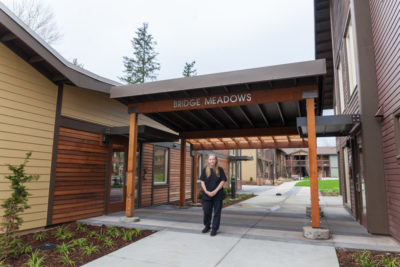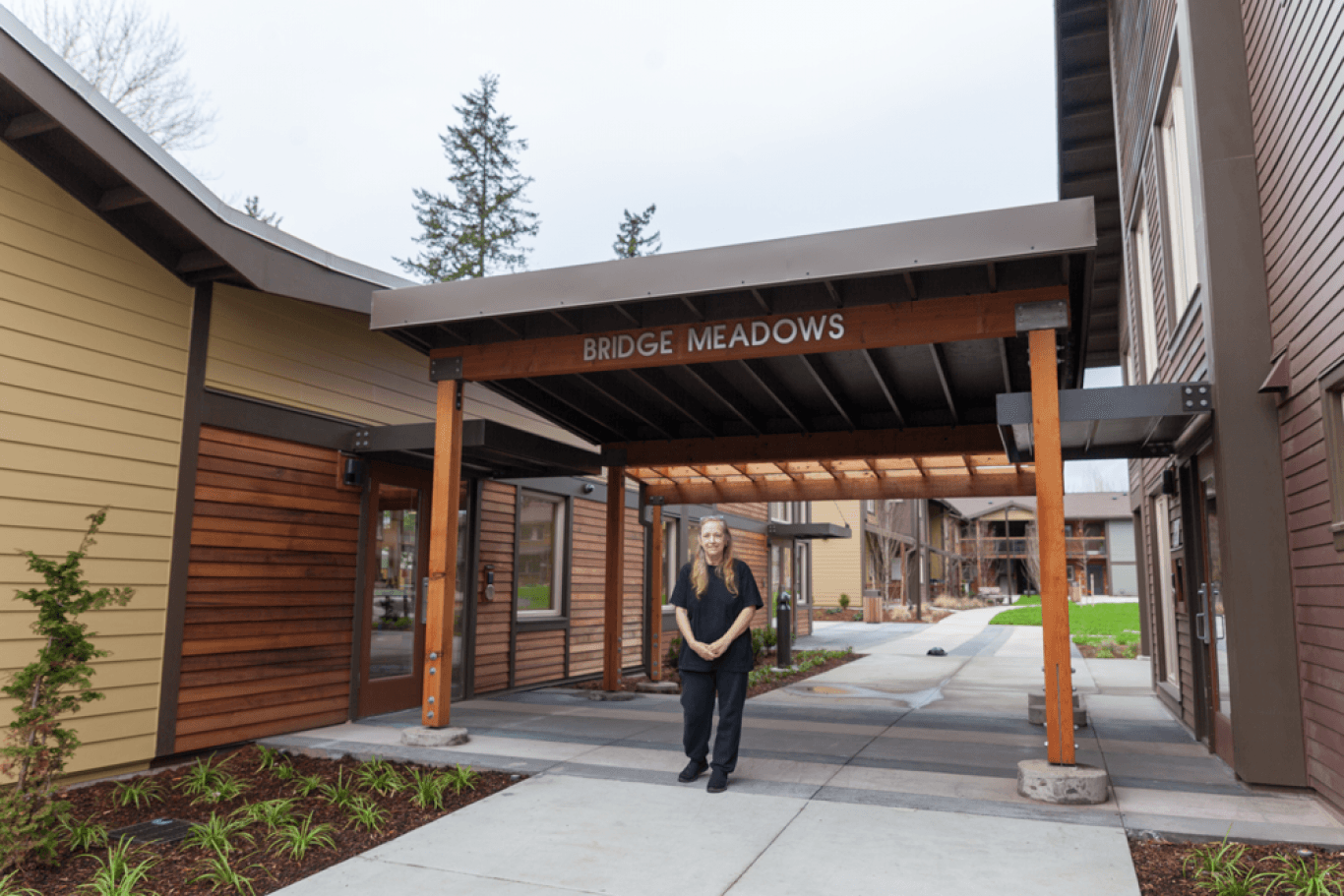Everyone needs a place to call home – by David Sarasohn
Everyone needs a place to call home – by David Sarasohn
If two Oregon ballot measures pass, thousands will have affordable housing
September 28, 2018 – For a long time Kathy Hackney, a veteran’s widow with multiple sclerosis, looked at the tents along the roads, and the people walking the streets with all their possessions in shopping bags, and worried about her future.
 And worse, about losing the child she was raising.
And worse, about losing the child she was raising.
When her husband, a Vietnam veteran badly injured in an explosion on his ship, was alive, their combined disability payments could just provide a place for themselves, and for the three-year-old cousin she took in because there wasn’t anyone else to do it. But when her husband died, Kathy’s $875 a month couldn’t find her a place to live – except what she saw out the window.
“I couldn’t find even a studio apartment on my income,” she remembers. “There’s nothing you can get. Everybody wants first and last month’s rent.” For a while she stayed with friends in Newberg, and worried.
“It was very stressful,” she remembers, especially the idea of “having to give up Johnny.
“If I hadn’t qualified for Bridge Meadows, I’d probably be in a homeless shelter.”
Bridge Meadows is an affordable housing facility, serving “intergenerational living,” run by a non-profit and supported by the city of Beaverton. Rent is based on a percentage of tenants’ income, and with some help from food stamps, Kathy – and Johnny, now 10 – can make it. Bridge Meadows is important at a time when a lot of grandparents have to raise their grandchildren – whether or not they can afford it.
“This is such a wonderful concept,” says Hackney, “of people living together.”
But right now, it has a four- to five-year waiting list.
Bridge Meadows is an example of the kind of housing to be produced by Measure 26-199, a $652.8 million Metro housing bond on the ballot in the Portland metropolitan area this November. Together with Measure 102, allowing governments to borrow for public-private housing partnerships, Measure 26-199 would build as many as 3,900 units of affordable housing in an area where “affordable housing” are two words that hardly ever meet.
By Metro’s calculation, it would keep up to 12,000 people from the streets, and remove an incalculable amount of fear from families like Kathy’s.
Oregon Food Bank endorses it, because housing problems and hunger are next-door neighbors.
“We have heard directly from people standing in food pantry lines,” says Oregon Food Bank CEO Susannah Morgan, “that they wouldn’t need to use a pantry if they had affordable housing.”
People don’t have to be completely homeless to be hungry. When rent is taking 40 or 50 percent of your take-home income, it tends to sharply shorten your shopping list at the supermarket.
All along the West Coast, as rent and homeless encampments have shot up together, cities and states are taking on the issue, having figured out that the only answer to a housing crisis is housing. This year, California has two housing bond issues on its ballot, totaling $6 billion, and Seattle has just doubled its spending on homelessness.
In greater Portland, where the problem and the tents stretch across the metropolitan area, Measure 26-199 takes on the problem through Metro, the regional government. “It’s an important step,” says Beaverton Mayor Denny Doyle, “to say we can do this as a region.”
Doyle has already seen housing developments such as Bridge Meadows work impressively in Beaverton, showing how public-private partnerships can economically and efficiently change lives, as well as the population of homeless encampments. If the bond measure passes, Doyle is thinking about another 400 units in Beaverton – and thinking about the people who will live in them.
Kathy thinks about that too, and about how her life was before, and what it might be without Bridge Meadows. Today, she is safe, she can be a secure caregiver, and she volunteers at an Oregon Food Bank partner agency, because “it’s good to be doing something” – besides living in fear.
As metropolitan voters look for their ballots in the mail, Bridge Meadows shows how governments can have an effective impact on the housing crisis, using imagination, some investment and some thoughtful partnerships.
Careful planning and operation can change the atmosphere, and change lives – such as Kathy Hackney’s.
And Johnny’s.
